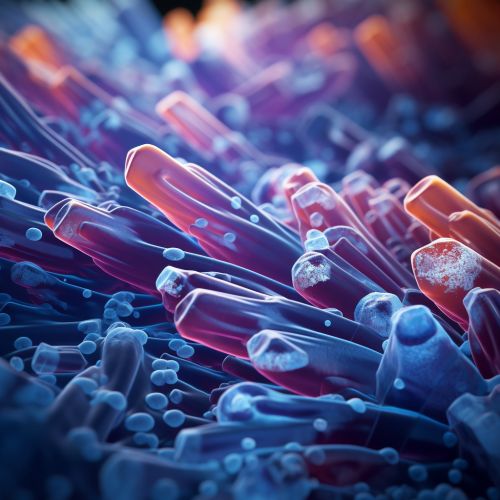Lactobacillus
Introduction
Lactobacillus is a genus of Gram-positive bacteria that are part of the lactic acid bacteria (LAB) group. They are non-spore forming, non-motile, and either rod-shaped or spherical. Lactobacillus species are known for their ability to produce lactic acid from carbohydrates, which gives them their name and classifies them as lactic acid bacteria. This process of lactic acid production is a type of fermentation, which is an essential function in many food and beverage production processes.


Classification and taxonomy
The genus Lactobacillus is part of the Lactobacillaceae family, within the order of Lactobacillales, class Bacilli, and phylum Firmicutes. The taxonomy of Lactobacillus has been subject to many changes over the years due to advancements in molecular biology and genomics.
Characteristics
Lactobacillus species are facultative anaerobes, meaning they can survive in both oxygen-rich and oxygen-poor environments. They are also mesophilic, with an optimal growth temperature range of 30 to 40 degrees Celsius.
Metabolism
Lactobacilli are heterofermentative, meaning they can metabolize a variety of substrates to produce lactic acid, as well as other byproducts such as ethanol and carbon dioxide. This metabolic flexibility allows them to thrive in a variety of environments and contribute to a range of fermentation processes.
Role in food and beverage production
Lactobacillus plays a crucial role in the production of many fermented foods and beverages, including yogurt, cheese, sourdough bread, beer, and wine. They contribute to the taste, texture, and preservation of these products.
Health benefits and probiotics
Many Lactobacillus species are considered probiotics, which are beneficial bacteria that can promote gut health. They can help maintain a healthy balance of gut flora, aid digestion, and boost the immune system.
Pathogenicity
While most Lactobacillus species are beneficial, some can be pathogenic and cause infections, particularly in people with weakened immune systems.
Research and future applications
Research into Lactobacillus continues to uncover new potential applications, from improving gut health to producing biofuels.
